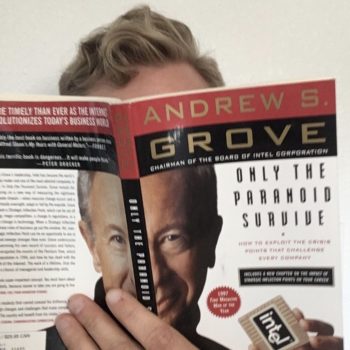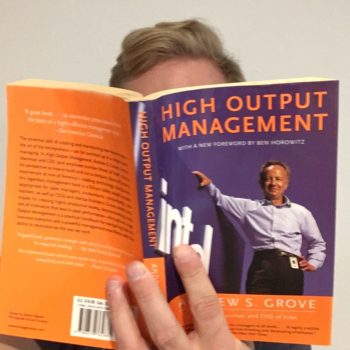
Only the Paranoid Survive
How to Exploit the Crisis Points that Challenge Every Company
Categories:
CTO,
Product Manager,
Startup Founder
How strongly do I recommend Only the Paranoid Survive?
7 / 10
Review of Only the Paranoid Survive
Only the Paranoid Survive is about strategic inflection points, those 10X changes that flip industries on their head.
What I like about this book is that Grove talks about the bad times, whereas most management books talk about the good times. This approach is similar to Ben Horowitz’s idea of Peacetime CEO / Wartime CEO.
This book is also a mini history lesson of the computer industry itself, documenting the rise of memory and microprocessor companies and technologies.
Overall it’s a good book, but if you only pick one Andy Grove book to read then you’re better off with High Output Management.
Top Ideas in This Book
- Strategic inflection points are 10X changes to the operating environment of a business and can either kill your company or open the door to success
- Middle managers and sales first recognize the changing tide; executives are last
- The more successful a person or company, the harder time they have grappling with a strategic inflection point
- Don’t differentiate without a difference - only build solutions because they improve customers lives, not because they differentiate you from competitors
- CEO changes are motivated by wanting someone not connected to the past, not the desire for stronger management skills
- Ask yourself: If you had a single bullet to fire, which of your competitors would you save it for?
- Fear of executive wrath is the most common way to kill the flow of critical information within an organization
- As an employee, you are a one-person business and need to protect your career from threats within and to your employer’s business
- Leaders need to read everything they can their hands on
Strategic inflection points are 10X changes to the operating environment of a business and can either kill your company or open the door to success
Strategic inflection points are not moments in time, but rather periods in time reflecting massive industry change.
The rise of ecommerce represented a strategic inflection point for retailers. The emergence of inexpensive memory production by Japanese tech companies was a strategic inflection point for Intel.
Middle managers and sales first recognize the changing tide; executives are last
Strategic inflection points are obvious in hindsight. Although you won’t be able to pin down exactly when it happened, you’ll know that something big obviously happened.
The first inklings of change come from sales people and middle managers. Sales people hear it from customers and other sales people. Middle managers hear it from their individual contributors. Both sales and middle managers are positioned to understand strategy and execution, providing them with the requisite knowledge to identify a strategic inflection point.
The more successful a person or company, the harder time they have grappling with a strategic inflection point
Successful companies want to remain successful, but ideally without change to their operations or the operating environment.
10X changes feel threatening to successful companies and many hunker-down, clinging to past success in the face of enormous change. These resistors are positioned to die.
Don’t differentiate without a difference - only build solutions because they improve customers lives, not because they differentiate you from competitors
When building a product or solution, avoid the temptation to one-up your competitors based on a feature checklist. You may be spending valuable time and money building something that customers don’t actually want.
CEO changes are motivated by wanting someone not connected to the past, not the desire for stronger management skills
Boards recognize that even CEOs are human and fall prey to sunk cost fallacies and past success. Changing CEOs is usually an act of recognizing these human flaws and finding someone who can perform the job with more objectivity.
Ask yourself: If you had a single bullet to fire, which of your competitors would you save it for?
If you want to gut check who is your real competition, ask yourself who you’d save your only bullet for. Try to think outside the box of which companies are normally considered your competition.
Fear of executive wrath is the most common way to kill the flow of critical information within an organization
Employees need the psychological safety to present bad news and unpopular opinions, especially up the chain to executives. Grove warns that executives need to proceed cautiously because even just one incident of responding negatively or in a threatening manner can cause lasting and possibly irreversible damage to the flow of information.
As an employee, you are a one-person business and need to protect your career from threats within and to your employer’s business
Most management books are about supporting the company, and while I appreciate those, I also appreciate Grove’s acknowledgement that you need to protect and advance your own career as well. Ideally you can do both and with a great employer that’s definitely possible.
Leaders need to read everything they can their hands on
Like Warren Buffett, Grove talks about reading a tremendous amount and consuming as much information as he can in order to make the most informed decisions possible.



